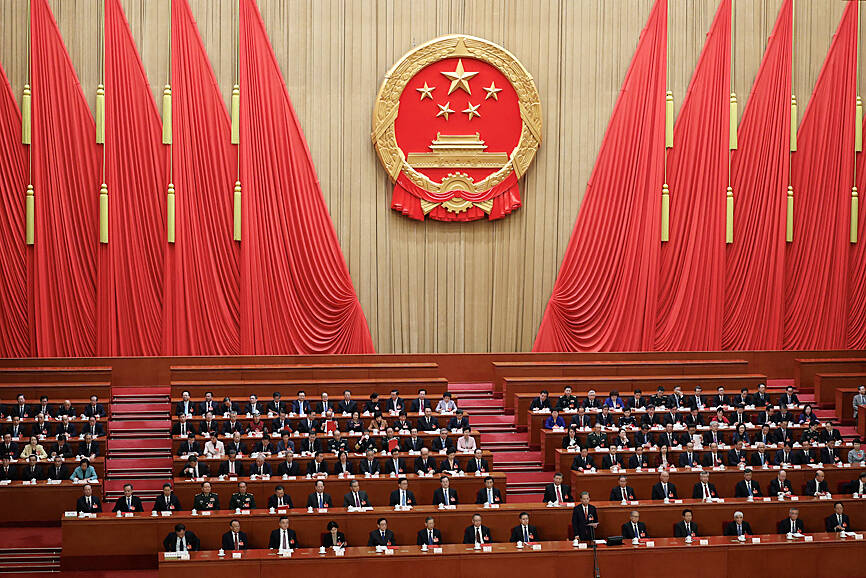China is likely to focus on its economy over the next four years and not set a timetable for attempting to annex Taiwan, a researcher at Beijing’s Tsinghua University wrote in an article published in Foreign Affairs magazine on Friday.
In the article titled “Why China isn’t scared of Trump: US-Chinese tensions may rise, but his isolationism will help Beijing,” Chinese international studies researcher Yan Xuetong (閻學通) wrote that the US and China are unlikely to go to war over Taiwan in the next four years under US president-elect Donald Trump.
While economic and military tensions between the US and China would likely heat up after Trump takes office next month, China’s main concern would be economic growth, he said.

Photo: Reuters
Trump might intensify his efforts to promote a broader decoupling from China and work to reduce the market share of Chinese products in the US, including products that are assembled outside China, and rely heavily on Chinese investment and components.
If that happens, Beijing might retaliate, sending the two countries into a tit-for-tat confrontation that could push the trade dispute to its peak, Yan wrote.
As a trade dispute heats up, the Trump administration would likely increase military pressure on Beijing, especially with US Senator Marco Rubio as secretary of state, and Pete Hegseth as secretary of defense, as both are staunchly anti-Beijing war hawks, he said.
If the US Senate approves their nominations, Trump might be encouraged to engage in bellicose remarks and impulsive actions in the South China Sea and the Taiwan Strait, potentially triggering a crisis similar to when then-US House of Representatives speaker Nancy Pelosi visited Taiwan in 2022, Yan said.
Her visit triggered unprecedented military drills around Taiwan.
On the other hand, Trump’s relative disinterest in ideological issues might soften some of the sharp confrontations between the US and China, Yan said, citing as examples Trump’s apparent lack of concern for human rights issues and disinterest in shaping China’s political system to match that of the US.
That would be in China’s interest, as the US would be unlikely to interfere in China’s internal affairs, enabling the Chinese Communist Party to focus on domestic political stability, he said, adding that the party has no intention of spreading its ideology globally.
Therefore, although economic and strategic conflicts between the two countries might increase, they would not likely escalate into ideological conflicts, Yan said.
While the issue of Taiwan’s sovereignty has always been a source of friction between the US and China, the two countries would be unlikely to go to war over this, he said, adding that Trump would also want to focus on US domestic issues, such as bolstering the US economy.
Competition between the US and China is focused on technological dominance, as national security and prosperity crucially rely on technological progress, Yan said.
The two countries would continue to compete with each other in fields such as artificial intelligence, and high-tech supply chains and markets, he said.

Chinese Nationalist Party (KMT) Chairman Eric Chu (朱立倫), spokeswoman Yang Chih-yu (楊智伃) and Legislator Hsieh Lung-chieh (謝龍介) would be summoned by police for questioning for leading an illegal assembly on Thursday evening last week, Minister of the Interior Liu Shyh-fang (劉世芳) said today. The three KMT officials led an assembly outside the Taipei City Prosecutors’ Office, a restricted area where public assembly is not allowed, protesting the questioning of several KMT staff and searches of KMT headquarters and offices in a recall petition forgery case. Chu, Yang and Hsieh are all suspected of contravening the Assembly and Parade Act (集會遊行法) by holding

PRAISE: Japanese visitor Takashi Kubota said the Taiwanese temple architecture images showcased in the AI Art Gallery were the most impressive displays he saw Taiwan does not have an official pavilion at the World Expo in Osaka, Japan, because of its diplomatic predicament, but the government-backed Tech World pavilion is drawing interest with its unique recreations of works by Taiwanese artists. The pavilion features an artificial intelligence (AI)-based art gallery showcasing works of famous Taiwanese artists from the Japanese colonial period using innovative technologies. Among its main simulated displays are Eastern gouache paintings by Chen Chin (陳進), Lin Yu-shan (林玉山) and Kuo Hsueh-hu (郭雪湖), who were the three young Taiwanese painters selected for the East Asian Painting exhibition in 1927. Gouache is a water-based

Taiwan would welcome the return of Honduras as a diplomatic ally if its next president decides to make such a move, Minister of Foreign Affairs Lin Chia-lung (林佳龍) said yesterday. “Of course, we would welcome Honduras if they want to restore diplomatic ties with Taiwan after their elections,” Lin said at a meeting of the legislature’s Foreign Affairs and National Defense Committee, when asked to comment on statements made by two of the three Honduran presidential candidates during the presidential campaign in the Central American country. Taiwan is paying close attention to the region as a whole in the wake of a

OFF-TARGET: More than 30,000 participants were expected to take part in the Games next month, but only 6,550 foreign and 19,400 Taiwanese athletes have registered Taipei city councilors yesterday blasted the organizers of next month’s World Masters Games over sudden timetable and venue changes, which they said have caused thousands of participants to back out of the international sporting event, among other organizational issues. They also cited visa delays and political interference by China as reasons many foreign athletes are requesting refunds for the event, to be held from May 17 to 30. Jointly organized by the Taipei and New Taipei City governments, the games have been rocked by numerous controversies since preparations began in 2020. Taipei City Councilor Lin Yen-feng (林延鳳) said yesterday that new measures by